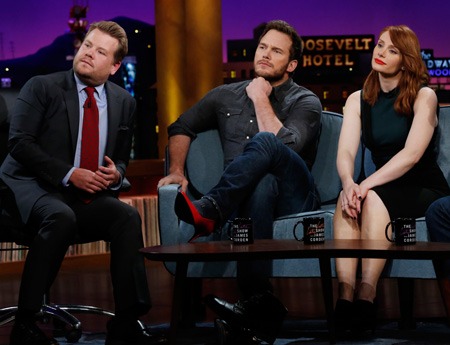Even With a Split Category, Variety Talk Is a Crowded Field

The smarter way to stay on top of broadcasting and cable industry. Sign up below
You are now subscribed
Your newsletter sign-up was successful
Perhaps no TV genre has changed in the past couple of years as much as late-night talk, which is funny, given that the genre previously could have been considered one of TV’s most stable.
But Jimmy Fallon took over The Tonight Show in February 2014, with Jay Leno moving into retirement after 22 years on the air, and the changes kept coming from there. David Letterman announced in April 2014 that he too would retire; in less than a week, CBS had named Stephen Colbert his replacement. Craig Ferguson opted to follow Letterman out the door; CBS surprised everyone by replacing him with a talented actor little known in the U.S.: James Corden.
While broadcast late night has been shifting, so has cable. Both of Comedy Central’s top-rated and Emmy-dominating late-night shows—The Daily Show With Jon Stewart and The Colbert Report with Stephen Colbert—are transforming radically.
When Colbert decided to jump to CBS, Comedy Central filled the slot with popular Daily Show “senior black correspondent” Larry Wilmore hosting The Nightly Show, which launched in January 2015. Another Daily Show correspondent, John Oliver, considered by many to be the heir apparent to The Daily Show given his stand-out performance after replacing Stewart in summer 2013, jumped to HBO. It took Oliver no time at all to make a splash.
This fall, Stewart—currently the dean of the modern late-night talk show—will step down and South African comic Trevor Noah will take his place.
All of that change means the race for outstanding variety talk show could be particularly competitive this year, even with the TV Academy splitting out sketch shows from the category.
Emmy Race Ripe for Upset
The smarter way to stay on top of broadcasting and cable industry. Sign up below
In 2013 The Colbert Report took the trophy from parent The Daily Show for the first time in 10 years and held on to it last year. Emmy pundits expect the trophy to go again to Colbert, but there are lots of shows that could upset that prediction.
First of all, Emmy might decide that it needs to award Letterman a farewell statue. The same could apply to Stewart. Oliver did breakthrough work this year with long features on arcane topics such as net neutrality and an exclusive interview with NSA whistle-blower Edward Snowden. And The Late Late Show’s Corden has surprised everyone by emerging on the scene a fully formed talent ready to play in the big leagues.

Corden, well known in the U.K., does it all. “He walked into Leslie Moonves’ office to pitch a sitcom and walked out with an offer to host a late-night show,” says Ben Winston, executive producer of The Late Late Show and a longtime colleague of Corden’s.
Late-night talk shows have evolved from the days when Johnny or Jay would do a five-minute standup routine to open the show and then sit down with guests one at a time on the in-studio couch. Today, hosts sing, dance, perform sketch comedy, host lip-sync battles and do in-car karaoke with celebrities—if you can think of it, they can probably do it.
“That’s the reason James wanted to do the job,” says Winston. “Rather than there being pressure to do all of these things, it’s the reason he looked at it and said, ‘I’d love a shot at that.’”
Corden already broke out well with sketches featuring him and Tom Hanks acting out all of Hanks’ films in six-and-a-half minutes, a video short starring Corden and David Beckham in their underwear and Corden doing karaoke in a car with Justin Bieber.
“We’re just thrilled to be on an Emmy ballot,” says Rob Crabbe, another executive producer on the show who came over from The Tonight Show With Jimmy Fallon.
That experience is probably why Corden’s already scored several viral hits even though the show’s only been on since March. The Hanks sketch alone already has more than 13 million views on YouTube.
Genre in the Zeitgeist
The relatively new relationship between late-night talk and YouTube is one of the reasons the genre feels so buzzy. With Jimmy Kimmel, host of Jimmy Kimmel Live on ABC, Fallon, Colbert, Corden, Conan O’Brien and so on, constantly posting their sketches on the service, viewers have 24/7 access to the shows, keeping them top of mind.
That said, that buzz hasn’t equaled ratings, and like all of TV, late-night talk’s ratings are down too.
“It comes down to money at the end of the day,” says Jeff Ross, executive producer of TBS’ Conan. “The networks have to figure out how to monetize all of this. But there’s also a relevance issue. To stay relevant, you want to be on YouTube.”
Still, producers and stars are happy to take the traffic, no matter where it comes from.
“It’s great that there are other avenues for exposure,” says Crabbe. “With so much choice and so many networks, the fact that people can find what we are doing and watch it, that’s a gift for late night.”
With Colbert premiering on CBS on Sept. 8 and Chelsea Handler coming to Netflix sometime next year, the late-night genre won’t be settling down anytime soon.
Contributing editor Paige Albiniak has been covering the business of television for more than 25 years. She is a longtime contributor to Next TV, Broadcasting + Cable and Multichannel News. She concurrently serves as editorial director for The Global Entertainment Marketing Academy of Arts & Sciences (G.E.M.A.). She has written for such publications as TVNewsCheck, The New York Post, Variety, CBS Watch and more. Albiniak was B+C’s Los Angeles bureau chief from September 2002 to 2004, and an associate editor covering Congress and lobbying for the magazine in Washington, D.C., from January 1997 - September 2002.

